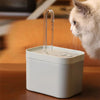Can Hot Weather Make Your Cat Sick? A Comprehensive Guide for 2025

Can Hot Weather Make Your Cat Sick? A Comprehensive Guide for 2025
As temperatures soar, it's crucial to understand how hot weather can affect our feline friends. Cats, unlike humans, don't sweat efficiently, making them particularly vulnerable to heatstroke and other heat-related illnesses. This comprehensive guide will explore the dangers of hot weather for cats, the symptoms to watch out for, and preventative measures you can take to keep your furry companion safe and healthy throughout the summer months.
Understanding Heatstroke in Cats
Heatstroke, or hyperthermia, is a life-threatening condition that occurs when a cat's body temperature rises to dangerous levels. This can happen quickly, especially in hot, humid conditions. Cats with certain health conditions, like heart disease or obesity, are at an even higher risk. The inability to regulate body temperature efficiently means even moderate heat can push them towards dangerous levels.
Symptoms of Heatstroke in Cats
Recognizing the signs of heatstroke is crucial for prompt treatment. Early intervention can significantly improve your cat's chances of survival. Watch out for these symptoms:
- Excessive panting or labored breathing
- Increased heart rate
- Drooling excessively
- Lethargy and weakness
- Staggering or incoordination
- Vomiting
- Diarrhea
- Reddened gums
- Seizures
- Loss of consciousness
If you notice any of these symptoms, seek immediate veterinary attention. Heatstroke is a medical emergency.
Preventing Heatstroke in Cats
Prevention is always better than cure. Here are some proactive steps you can take to protect your cat from the dangers of hot weather:
- Provide plenty of fresh water: Ensure your cat always has access to cool, clean water. Consider adding ice cubes to their water bowl to keep it extra refreshing.
- Keep them indoors during peak heat: Limit your cat's outdoor time during the hottest parts of the day (typically between 10 a.m. and 4 p.m.).
- Create cool spaces: Provide shady areas, fans, or air conditioning to keep your cat cool indoors. Consider placing cooling mats in their favorite spots.
- Grooming: Regular grooming helps remove excess fur, allowing for better heat dissipation.
- Never leave your cat in a parked car: Even on a mildly warm day, the temperature inside a parked car can rise to dangerous levels quickly.
- Monitor your cat closely: Pay close attention to your cat's behavior and body language. If you see signs of distress, act immediately.
- Consider a cooling vest or mat: For cats who struggle to regulate their temperature, a cooling vest or mat can be a helpful addition. These are particularly beneficial for short-nosed breeds or those with underlying health issues.
- https://everypetpalace.com/collections/cat-supplies/Fountains
Other Heat-Related Illnesses
While heatstroke is the most severe heat-related illness, cats can also suffer from heat exhaustion and other less severe conditions. These can include dehydration, lethargy, and decreased appetite. Even these milder conditions require attention and should be addressed with veterinary care.
Frequently Asked Questions (FAQs)
Q: What should I do if I think my cat has heatstroke?
A: Immediately move your cat to a cool place, apply cool (not cold) water or a cool compress to their paws and belly, and contact your veterinarian or emergency animal hospital immediately.
Q: Are certain breeds of cats more susceptible to heatstroke?
A: Yes, cats with short noses, like Persians and Himalayans, are often more prone to heatstroke due to their respiratory system's limitations.
Q: Can I give my cat ice cubes to cool down?
A: While offering ice cubes in their water is fine, avoid directly applying ice to their fur, as this can cause shock.
https://everypetpalace.com/collections/cat-healthcare
Conclusion
Protecting your cat from the dangers of hot weather is a crucial aspect of responsible pet ownership. By understanding the risks, recognizing the symptoms of heatstroke, and implementing preventative measures, you can help ensure your feline friend stays safe and healthy throughout the summer months. Remember, prompt veterinary attention is key when dealing with any heat-related illness. Keep your cat cool, keep them hydrated, and enjoy the summer together!




